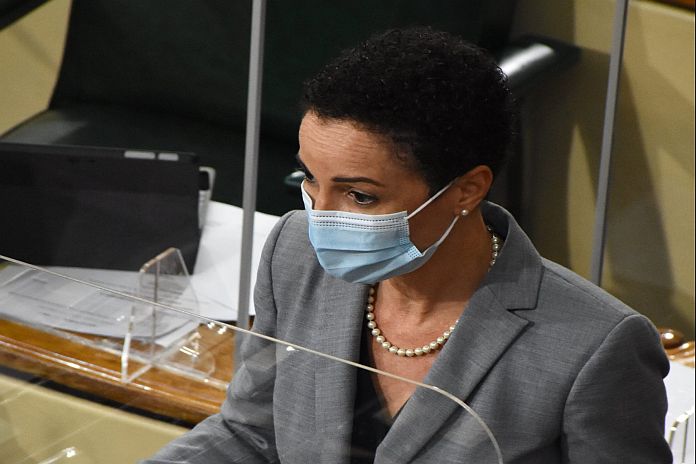By Alecia Smith
KINGSTON, Jamaica, (JIS) – Enhanced operating protocols and procedures have been proposed to improve the implementation of the Shiprider Agreement between the United States and Jamaica under which, both countries cooperate to curtail illicit maritime drug trafficking.
This follows an incident in October 2020 where four Jamaican men aboard the Jamaican-registered vessel “Lady Lawla” were detained after the boat was intercepted, its cargo inspected by the US Coastguard, and items allegedly found to contain a type of narcotic drug or psychotropic substance.
Following the detention of the men, the Lady Lawla was destroyed on the grounds of representing a danger to navigation, pursuant to the provisions of the Shiprider Agreement, and the United Nations Convention Against Illicit Traffic in Narcotic Drugs and Psychotropic Substances, as well as standard maritime practice.
However, on December 15, the US Southern District Court dismissed charges brought against the four Jamaicans on the grounds of lack of evidence. The ministry of foreign affairs and foreign trade was only made aware of this development on December 28, from media reports.
The government took immediate action to have the men returned to Jamaica as quickly as possible. They had been scheduled for repatriation on January 28, 2021, under order of deportation. The Ministry, through diplomatic communication with the US Embassy worked to ensure the return of the four men to Jamaica on December 31 on a regular commercial flight.
In a statement during the sitting of the Senate on Friday, January 15, minister of foreign affairs and foreign trade, Senator Kamina Johnson Smith, said new operating protocols and procedures have been proposed following a meeting with the relevant US and Jamaican stakeholders to further review the operational procedures associated with the Shiprider agreement’s implementation.
While not explicitly stating what the new proposed arrangements are, Johnson Smith said they relate to procedures following the boarding and search of intercepted vessels; and the status of nationals from the time of the granting of a waiver up to the outcome of any legal or judicial action pursued against them, pursuant to the agreement.
Under the Shiprider Agreement, the Jamaican government can grant a waiver of jurisdiction over the intercepted vessel, cargo and persons onboard, as in the case of the Lady Lawla.
“What we are seeking to do is to ensure … that the waiver is granted in circumstances where the best information possible has been provided and that the information also provided to the government of Jamaica throughout this entire process – from beginning to end, is sufficient and timely,” she said.
The Jamaican team comprised the ministers of foreign affairs and foreign trade and national security and the attorney general, supported by an inter-ministerial technical team; while the US delegation comprised the ambassador of the United States to Jamaica, senior embassy officials, senior officials of the US coast guard as well as representatives of the Departments of Justice and State.
“The Jamaican government expressed in very clear terms, certain steps key to bridging gaps in implementation as well as its strong disappointment at the recent developments including the failure of the US authorities to communicate critical information on the dismissal of the case, as envisaged by the agreement,” she said.
Senator Johnson Smith noted that during the bilateral exchange, which was constructive and frank and undertaken in a spirit of cooperation and mutual respect, apologies were extended to Jamaica by the United States regarding the handling of the matter.
“Both sides agreed on … the importance of the longstanding bilateral relations between Jamaica and the United States; the continued relevance and validity to the Shiprider Agreement to meeting the desired objectives of stemming the narcotics trade and eliminating its contribution to crime and violence in the country; the importance of taking appropriate action to treat with any difficulties which may arise in the implementation of the Agreement to ensure its optimum effectiveness; and a commitment to work towards including in a timely manner, agreement on enhanced operational procedures starting with a response by the US to suggestions made and questions posed within two to three weeks of that meeting,” she said.
Johnson Smith further assured of the government’s resoluteness in its pursuit of the necessary improvements in the implementation of this important agreement, noting that “the government continues to work to protect Jamaica’s safety, sovereignty and the human rights of Jamaican nationals everywhere”.
Jamaica entered into the Shiprider Agreement in 1997, which was brought into force by the passage of the Maritime Drug Trafficking (Suppression) Act, 1998. This Act has since been amended twice – in 2004 and 2016.
The Agreement sought further cooperation in deterring the movement of illicit drugs through Jamaican territorial waters from South America to the US. It further allows for cooperation in ship boarding, ship riding and overflight.
In addition, US Coast Guard law enforcement detachments operating from specific foreign government ships will be able to board suspected ships in Jamaican waters. It also speeds up the provision of technical assistance including drug detection technology between the countries and puts a framework in place for the exercise of jurisdiction in each nation’s continuous zone.
Importantly, it ensures greater protection for civil aircraft, including an agreement that neither the US nor Jamaica will use force against civil aircraft in flight.





